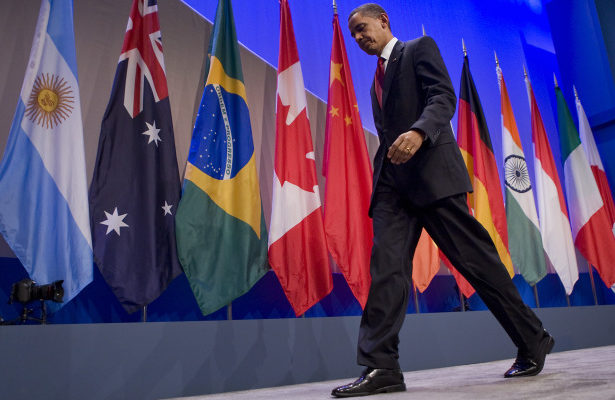President Barack obama's political idea and practical foreign policy deserve special attention and rigorous analysis. As it turns out, his policy ideals and practices reasonably shaped a tranquil world better than the one he inherited from his predecessors. That is, his earnest efforts of foreign policy based on diplomacy, cooperation, multilateralism and minimum use of military force. In practical sense, he ends the wars in iraq and Afghanistan, actively striving to eradicate religious terrorist groups, particularly ISISL and al Qaeda. Moreover, he is working to bring peace and stability in Syria, Iraq, Libya and other countries. In addition, he brokered a nuclear deal with Iran, normalized U.S. relations with Cuba, enhanced and opened new relations with many different countries around the world. To be sure, he is negotiating free trade agreement in the Trans-Pacific and Transatlantic areas; and energetically promoting discussions on global climate change.
Admittedly, Obama's foreign policy is a gift to those who care much about diplomacy, multilateralism, cooperation and seeking to have a peaceful/less violent world. In deed, Obama's foreign policy is fine account of world order in our time, and also a memorandum for future generations. However, despite of Obama's success in different international trends, his foreign policy is not immune from criticism, malaise and discontent. As it turns out, some critics conceived Obama's foreign policy as seemingly narrow. Again, others have condemned him for being timid and ineffective, passive and not able to protect American interest. Some have accused him of cynicism, and even they claimed that his policy of reconciliation leads America to retreat from its world leadership. Moreover, some argued that Obama's primary goal seems to end his presidential years and being able to say that he had shrunk America's involvement in Iraq and Afghanistan, prevented U.S. military involvements on the ground in Syria and Libya. More specifically, few critics declared that Obama is quite busy trying to distinguish his foreign policy from President George W. Bush's foreign policy.
Perhaps, Obama's foreign policy style deserves to be scrutinized, critically examined and contested. Besides, it is reasonable for the opponents to disagree with his foreign policies. Actually, not only Obama's opponents are being quite harsh in their criticisms, so even his supporters to some extend are critical to some part of his foreign policy. In fact, there is considerable conceptual and practical controversy among Obama's supporters. One of their fundamental questions is how far Obama's foreign policy changed the world for better in the way that he indicated during his election campaign? The answer might be, there is some progress, but there is still nothing so far reaching as the radical positive change. Further, some views believe that President Obama set back from some very critical international issues that he outlined during his campaign. To explain: They see that he is not able to close Guantanamo Bay prison, or to deal effectively with the issue of human rights violations around the world, stop genocide in Darfur, end the civil wars in sudan, Libya and Syria and tackle the middle east issues, etc. Also, they believe that he is less effective in the issue of religious fundamentalist groups, ecological crisis and some other censorious problems around the world. However, we at The Key Group believe that despite all of the genuine concerns and severe criticisms, it is quite unfair, to label Obama as weak and not able to protect American interest and supremacy. Yes, one can say that his foreign policy is different from his predecessors, but is effectively positive. What he has done and still doing is remarkable and deserves credit.
Further, we believe, it is unfair to label President Obama as busy trying to distance his foreign policy from his predecessor President George W. Bush's foreign policy. In reality, and from the day-one, Obama's foreign policy is quite distinctive from Bush foreign policy. To be more precise, Obama differentiated his foreign policy form Bush policy early on during his first presidential campaign on April 23, 2007. At that time, he vividly introduced his foreign policy that included his idea against Bush's war in Iraq. Moreover, he promised to end the wars and bring the American troops home among the other promises. Basically, Obama ran for presidency as an opponent to Bush foreign policy and specially on wars in Iraq and Afghanistan.
On such view, it is clear that Obama's foreign policy is very different from Bush's foreign policy. In other words, it is obvious that President Bush and President Obama's foreign policies are framed on opposite philosophical conceptions. Unlike Obama, Bush's foreign policy was based on unilateralism, military aggression and wars that cost America and other countries so dearly. The flip-side, Obama formulated his foreign policy based on diplomacy, human rights, multilateralism, selective military targets, economic interdependence and environmental awareness. In addition, Obama's foreign policy minimized human casualties, saved and restored America's leadership in the world, and provides an adequate response to unfolding global challenges.
More precisely, Obama and Bush also are differing in notion of “War on Terror”. Their core difference is that Bush encouraged direct military intervention against Al Qaeda in Afghanistan. In contrast, Obama uses intelligence and minimum military power to kill Osama Bin Laden, and reduced Al Qaeda threats. Similarly, it seems that he is still using the same methods on his ongoing war on terror such as ISIL and other terrorist groups. Thus far, he reassured his war on terror shortly after the terrorist attack in Orlando – Florida, San Bernardino – California, Paris attacks in France and Brussels Airport in Belgium. He indicated clearly in his press conferences that he is going to defeat the terrorist groups. As he famously indicated: “That is how we are going to defeat these terrorist groups. In part, because we're going after them and taking strikes against them, and arresting them, and getting intelligence on them, and cooperating with other countries. But a lot of it is also going to be to say, you do not have power over us. We are strong. Our values are right. You offer nothing except death”. In this sense, and without the slightest hint of passivism, Obama stands on the brink of a “realistic utopia”.
From the above consideration, Obama's foreign policy is quite compelling. He is able to protect American interest, cooperate with other nations and states, and maintains U.S. supremacy. The inspired fascination, he is always trying to avoid the excessive use of military forces to deal with his advisers around the world. Again, he is very conscious about how to interact with other countries and nations. He recognizes ideological, cultural and religiously diverse world. Above all, he is able to construct a shared principles and norms of cooperation between U.S. and the international community and specially with non-democratic countries. More precisely, Obama's conception of foreign police emerges out of his moral and philosophical perception. In sense, it came out of political and moral idea that is based on diplomacy, cooperation, justice, human rights and tolerance. Such kind of ideals and principles are much needed in our contemporary fragmented world; and also it could be a valuable guidance for future generations. Indeed, it is a call for all of us to think again, and think harder about humanizing America's foreign policy.
Overall, we at The Key Group perceive that President Barack Obama's revived the American foreign policy debates. Admittedly, he succeeded to challenge the way in which many people perceive America's foreign policy. Without a doubt, he convinced us to re-think about America's traditional foreign policy at large. In specific sense, he reasonably positioned America's supremacy in our increasingly riven world in a useful and illuminating context. Thus far, one final point, readers of President Obama's political idea one hundred years from now may conclude that Obama's foreign policy was a manifestation of civility, human rights, equality, toleration, a peaceful world and human prosperity.

